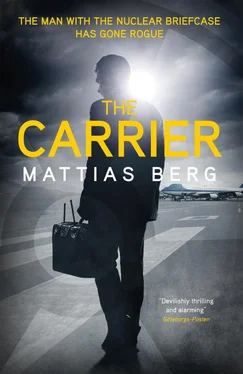Mattias Berg - The Carrier
Здесь есть возможность читать онлайн «Mattias Berg - The Carrier» весь текст электронной книги совершенно бесплатно (целиком полную версию без сокращений). В некоторых случаях можно слушать аудио, скачать через торрент в формате fb2 и присутствует краткое содержание. Город: London, Год выпуска: 2019, ISBN: 2019, Издательство: MacLehose Press, Жанр: Триллер, на английском языке. Описание произведения, (предисловие) а так же отзывы посетителей доступны на портале библиотеки ЛибКат.
- Название:The Carrier
- Автор:
- Издательство:MacLehose Press
- Жанр:
- Год:2019
- Город:London
- ISBN:978-0-85705-788-4
- Рейтинг книги:4 / 5. Голосов: 1
-
Избранное:Добавить в избранное
- Отзывы:
-
Ваша оценка:
- 80
- 1
- 2
- 3
- 4
- 5
The Carrier: краткое содержание, описание и аннотация
Предлагаем к чтению аннотацию, описание, краткое содержание или предисловие (зависит от того, что написал сам автор книги «The Carrier»). Если вы не нашли необходимую информацию о книге — напишите в комментариях, мы постараемся отыскать её.
The Carrier — читать онлайн бесплатно полную книгу (весь текст) целиком
Ниже представлен текст книги, разбитый по страницам. Система сохранения места последней прочитанной страницы, позволяет с удобством читать онлайн бесплатно книгу «The Carrier», без необходимости каждый раз заново искать на чём Вы остановились. Поставьте закладку, и сможете в любой момент перейти на страницу, на которой закончили чтение.
Интервал:
Закладка:
In the spring of 1946, Meitner was offered the post of visiting professor at Washington D.C.’s Catholic University and was still often referred to as “The Mother of the Atomic Bomb”. During her time in the U.S. she received hundreds of letters from admirers, was chosen as “Woman of the Year” by the National Press Club, gave seminars at Princeton and had intensive discussions with Einstein. But despite this triumphal procession, Meitner still chose to live in Sweden rather than in the U.S. Concluding her guest professorship, she therefore left her close friends in senior scientific circles, declined all of the grand proposals put to her by Einstein and others, and returned to Stockholm.
There her circumstances had improved after all the international attention paid to her. Half a year after the American journey she got a personal professorship and an experimental laboratory in her own name: the “Meitner Laboratory”, only loosely connected to Tekniska Högskolan.
But the atomic bombs were obviously casting their shadow over Sweden. Not even this small country far from the world scene could ignore what might happen, whether it be the risk of being attacked with the new super-weapon or the possibility of constructing one. Prime Minister Erlander’s diary note from September 1945 is telling:
“The construction of the atom bomb can no longer be kept a secret, but the purely technical conditions necessary for such a project are missing in all countries except the U.S. It will take at least five years before the Russians catch up with the Americans. These five years will be decisive for the fate of the world. If the Russians’ isolation and mistrust can be broken, peace is possible. If not, we must prepare ourselves for catastrophe.”
It is hard not to think of Meitner in this context. That her friend Aina Erlander could simply have passed on an informal message to her husband, who then agreed to meet Meitner for a cup of tea somewhere. That such a prominent researcher—within this very field—might at least have been consulted in an initially non-committal discussion about the possibilities of, and difficulties in, creating a Swedish atom bomb.
But despite all my searches in the Stockholm archives, I have found no empirical support for such a hypothesis. Nor the least notation about a meeting with the Prime Minister, no suggestive line in a letter, which might point to Meitner having had a concrete involvement in the Swedish nuclear weapons program.
Yet the uncertainty remains. We have essentially no knowledge about Meitner’s last eleven years in Sweden. The decade when the hydrogen bomb began to be both mass-produced and deployed, which created the global nuclear weapons system in its current form. The trail ends with her becoming a Swedish citizen in 1949. In those sources which are available, Meitner’s activities are mostly summarized as having consisted of being active in the F.O.A. and Tekniska Högskolan, where she participated in the expansion of the country’s first experimental reactor, R.1.
To repeat: for all of these paradoxes I have been unable to find any more precise a description than “Lise Meitner’s Secret”. In the final chapter of this dissertation I will revert to its deeper implications.
5.03
I was woken by voices very close to me. Not just Jesús María’s—but also Ingrid’s. She looked at me, rosy about the cheeks, miraculously restored as so often before.
“Erasmus, my treasure, wonder of wonders, you can’t imagine how happy I am to see you! That you managed to survive, after everything you must have been through up in Jukkas… what happened? What did they do to you, my friend? You must tell me everything, in your own good time.”
I stared at her: this superwoman with her ability to endure pretty much anything and then rise from the ashes. I looked around the plane. Glanced behind me, across the aisles, toward the sleeping passengers in the dimmed light of the cabin. Checked for the air stewards who could still appear at any moment. Looked at the clock, still a few hours to go before our scheduled arrival.
“Yes, in my own good time…” I said.
“Then I can also tell you what we’ve been through. How we managed to catch up with them there in the forest, the whole commotion, before Jesús María and I escaped and made our way to Kleine Brogel in time for Spotter’s Day.”
Ingrid must have seen my anxiety, how I was still looking over my shoulder toward the economy class section, and in front of me toward where the cabin crew would be coming from. Yet she just kept on going—having switched into Swedish and lowered her voice significantly but still not enough.
“And I must really thank you for all your care on the way here. I could scarcely have been in better hands.”
On Ingrid’s fold-out table, as on Jesús María’s, stood an almost empty glass. It did not appear to be her first tequila either, which might explain the flush on her cheeks. The sudden recovery. The miracle cure.
“Jesús María has told me about your wild plan. To take out John as well, right there in the lion’s den, play with the fire. Show Ed who has the upper hand: the finger on the button. How big the risks we’re prepared to take, both for ourselves and for the world. And then to vanish again, like the wind.”
I nodded cautiously, tried not to look at either of them.
“That’s it. That’s the idea.”
“I’m impressed, my treasure.”
She stood up, got her new black bag out of the overhead compartment, and laid it on the floor in front of me. Continued in little more than a whisper in Swedish. It came back to me, everything she had taught me of this too, the language, during our dissertation sessions. Jesús María was showing no interest at all—had fallen asleep again, now assisted by the alcohol as well as the effects of the injection—seemingly like everybody else within earshot. The stewards were still somewhere else, the whole plane dimmed and in night-flight mode.
Ingrid seemed wholly reliant on Edelweiss’ arrangements. Was content for him to keep pulling the strings, making sure nobody stopped us from walking into his lair.
“By the way, you might like to have this back…”
She gave me a strangely amused look and nodded at the black bag—so I leaned down and opened the zipper half-way. Saw the briefcase lying there. At least from this distance it looked the same as it had when taken from me in Suite 325.
“It’s still functional. Retrieving it was top priority. We caught up with them in the forest, after fighting them off in the room of your martyrdom, Erasmus, and we were persuasive in our methods that led to its surrender. But they escaped. Not only Zafirah, also John. And the poor hotel guide, their dupe for Sixten. Whatever they paid him, it was not enough, my treasure. We chased after them in the snow—he was tired, struggling—Zafirah was not kind to him in the end, our weaver of unicorn tales.”
She bent and opened the bag a bit more. Just so I could see more of its contents: my field knife, cell phone, watch, crunch cookies, notebook, medical pack and my weapon.
But no key. The one that Sixten had given me in Ursvik: to Meitner’s laboratory under the red trap-door.
“You see, it’s all here!” Ingrid said triumphantly.
I zipped the bag shut, let it stay there at my feet, under my watchful eye. Had another sip of the tequila. Took a deep breath—and asked yet another of my questions.
“So why did Sixten give us away?”
Ingrid looked at me first, then gazed out of the window, into that black void.
“Did he?” she said. For a second she did not move. “They had Lisa, his kryptonite. Evidently took her as some sort of hostage after our swoop at Estrange.”
Читать дальшеИнтервал:
Закладка:
Похожие книги на «The Carrier»
Представляем Вашему вниманию похожие книги на «The Carrier» списком для выбора. Мы отобрали схожую по названию и смыслу литературу в надежде предоставить читателям больше вариантов отыскать новые, интересные, ещё непрочитанные произведения.
Обсуждение, отзывы о книге «The Carrier» и просто собственные мнения читателей. Оставьте ваши комментарии, напишите, что Вы думаете о произведении, его смысле или главных героях. Укажите что конкретно понравилось, а что нет, и почему Вы так считаете.












